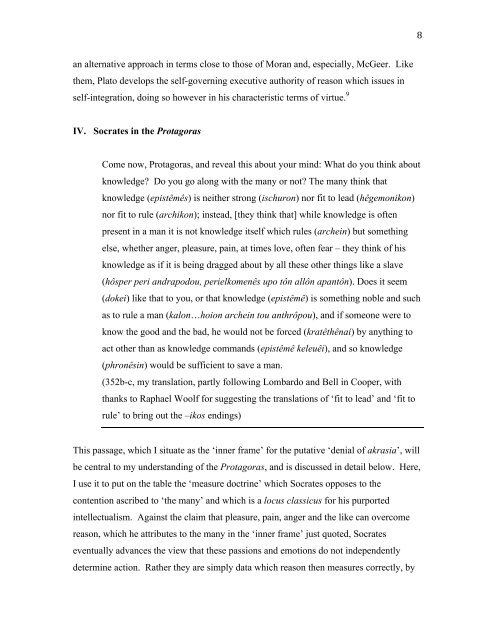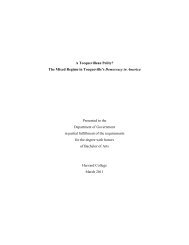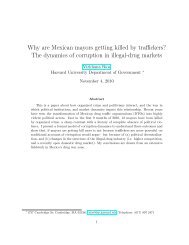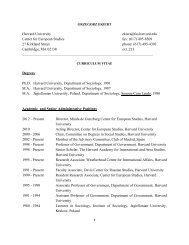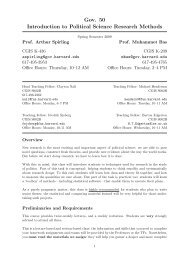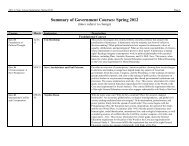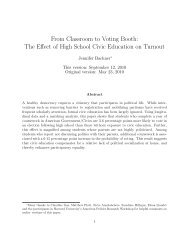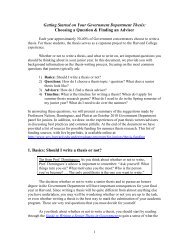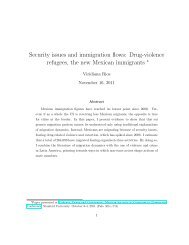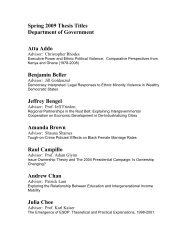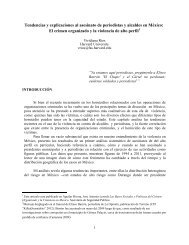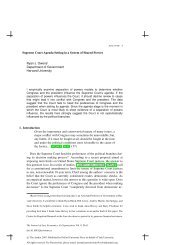1 Harvard University Political Theory Colloquium For 11 March 2010 ...
1 Harvard University Political Theory Colloquium For 11 March 2010 ...
1 Harvard University Political Theory Colloquium For 11 March 2010 ...
Create successful ePaper yourself
Turn your PDF publications into a flip-book with our unique Google optimized e-Paper software.
8 <br />
an alternative approach in terms close to those of Moran and, especially, McGeer. Like<br />
them, Plato develops the self-governing executive authority of reason which issues in<br />
self-integration, doing so however in his characteristic terms of virtue. 9<br />
IV. Socrates in the Protagoras<br />
Come now, Protagoras, and reveal this about your mind: What do you think about<br />
knowledge? Do you go along with the many or not? The many think that<br />
knowledge (epistêmês) is neither strong (ischuron) nor fit to lead (hêgemonikon)<br />
nor fit to rule (archikon); instead, [they think that] while knowledge is often<br />
present in a man it is not knowledge itself which rules (archein) but something<br />
else, whether anger, pleasure, pain, at times love, often fear – they think of his<br />
knowledge as if it is being dragged about by all these other things like a slave<br />
(hôsper peri andrapodou, perielkomenês upo tôn allôn apantôn). Does it seem<br />
(dokei) like that to you, or that knowledge (epistêmê) is something noble and such<br />
as to rule a man (kalon…hoion archein tou anthrôpou), and if someone were to<br />
know the good and the bad, he would not be forced (kratêthênai) by anything to<br />
act other than as knowledge commands (epistêmê keleuêi), and so knowledge<br />
(phronêsin) would be sufficient to save a man.<br />
(352b-c, my translation, partly following Lombardo and Bell in Cooper, with<br />
thanks to Raphael Woolf for suggesting the translations of ‘fit to lead’ and ‘fit to<br />
rule’ to bring out the –ikos endings)<br />
This passage, which I situate as the ‘inner frame’ for the putative ‘denial of akrasia’, will<br />
be central to my understanding of the Protagoras, and is discussed in detail below. Here,<br />
I use it to put on the table the ‘measure doctrine’ which Socrates opposes to the<br />
contention ascribed to ‘the many’ and which is a locus classicus for his purported<br />
intellectualism. Against the claim that pleasure, pain, anger and the like can overcome<br />
reason, which he attributes to the many in the ‘inner frame’ just quoted, Socrates<br />
eventually advances the view that these passions and emotions do not independently<br />
determine action. Rather they are simply data which reason then measures correctly, by


